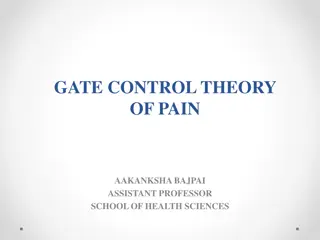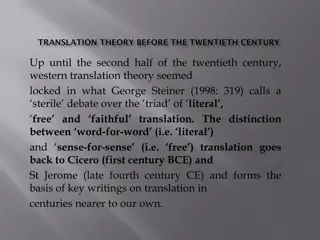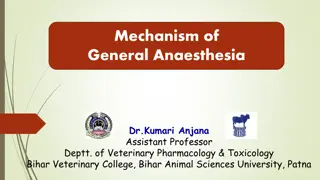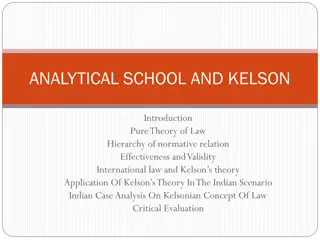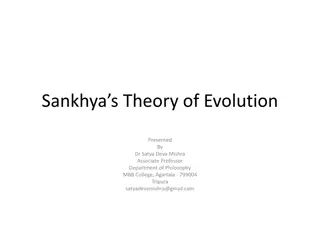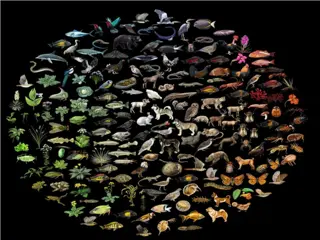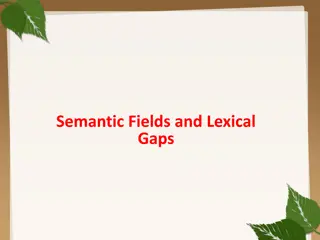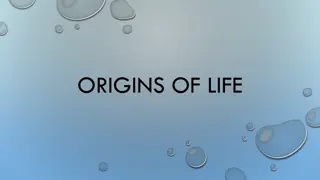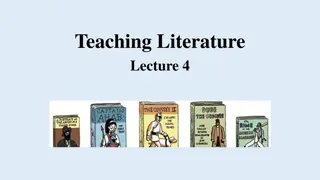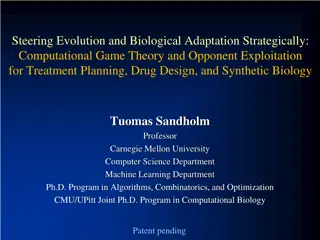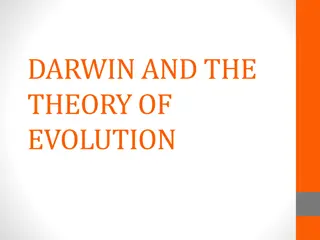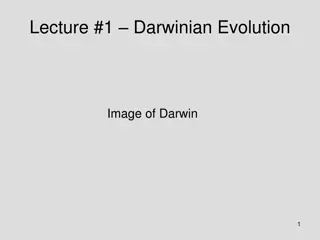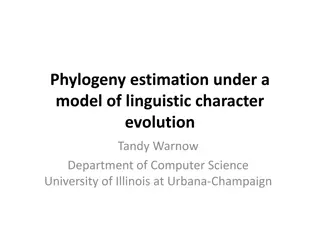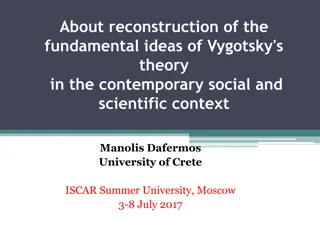Ginzburg Landau phenomenological Theory
The Ginzburg-Landau phenomenological theory explains superconductivity and superfluidity as distinct thermodynamic phases. It focuses on phase transitions characterized by singularities in specific heat at the transition temperature. Derived from BCS theory, it quantifies condensation energy, emphas
1 views • 38 slides
Crystal Field Theory in Transition Metal Complexes
Crystal Field Theory (CFT) explains the colors and magnetic properties of transition metal complexes. It focuses on the energy changes in d-orbitals of metal ions caused by surrounding ligands. This theory, developed in 1929, provides insights into the bonding interactions in complex compounds. The
10 views • 44 slides
Understanding Social Learning Theory and the Power of Example
Social Learning Theory, introduced by Bandura, emphasizes learning through observation and modeling. It explores how individuals acquire behavioral dispositions, trial-and-error experiences, and the impact of stimuli in the environment. The theory focuses on the importance of attention, retention, a
1 views • 17 slides
Evolution of Mathematical Theories and Proof Systems
Development of mathematical theories such as model theory, proof theory, set theory, recursion theory, and computational complexity is discussed, starting from historical perspectives with Dedekind and Peano to Godel's theorems, recursion theory's golden age in the 1930s, and advancements in proof t
1 views • 29 slides
Introduction to Organizational Behavior: Management Theories and Practices
Explore the evolution of organizational behavior from early management theories to contemporary practices. Understand the historical foundations and relevance of management theory in shaping workplace dynamics. Delve into key concepts like Scientific Management, Administrative Management, Bureaucrat
1 views • 28 slides
Theories on the Origin of State: Divine, Force, Patriarchal, and More
Various theories such as Divine Origin, Force Theory, Patriarchal Theory, and others explain the origin of the state. Divine theories attribute state creation to God, while Force Theory emphasizes the strong subjugating the weak to establish authority. Each theory offers unique perspectives on the h
1 views • 24 slides
Understanding Forgetting: Theories and Influence on Memory Recall
Forgetting is a complex phenomenon influenced by theories such as Decay Theory, Interference Theory, and Motivated Forgetting. The Ebbinghaus forgetting curve highlights how memories fade over time. Decay Theory suggests memories decay over time, while Interference Theory explains how old and new me
0 views • 25 slides
Psychological Theories of Criminality: Understanding the Roots
Psychological theories of criminality delve into the association between intelligence, personality, learning, and criminal behavior. Major theories include Psychodynamic Theory by Freud, Behavioral Theory by Bandura, and Cognitive Theory by Kohlberg. These theories explore how unconscious mental pro
1 views • 20 slides
Austin's Theory of Law by Rinkey Sharma: An Overview
Austin's Theory of Law, presented by Rinkey Sharma, delves into the Imperative Theory of Law as proposed by Austin, known as the father of English jurisprudence. It explores General and Particular Jurisprudence, Austin's definition of law, and the elements of positive law, emphasizing the concepts o
0 views • 11 slides
Theories of International Relations Overview
The field of International Relations (IR) encompasses various theories that seek to explain global phenomena, drawing from disciplines like history, philosophy, and economics. Theory, derived from contemplation and speculation, organizes ideas to explain issues such as state emergence, conflict caus
1 views • 47 slides
Understanding the Gate Control Theory of Pain in Pain Management
This detailed content delves into the Gate Control Theory of Pain, explaining pain pathways involving nociceptors, A-delta fibers, and C fibers. It further explores central pain pathways like the spinothalamic tract, spinomesencephalic tract, and spinoreticular tract. The theory's mechanism of pain
3 views • 11 slides
Overview of Cooperative Game Theory and Bargaining Solutions
Cooperative game theory explores situations where players have mutual benefits in cooperating. The focus is on bargaining solutions to reach agreements despite conflicting interests. Key concepts include Nash Bargaining Solution, Kalai-Smorodinsky Bargaining Solution, and Rubinstein Bargaining Proce
1 views • 24 slides
Evolution of Translation Theory: From Literal to Sense-for-Sense
Western translation theory up to the 20th century revolved around the debate of literal, free, and faithful translation. This discussion traces back to Cicero and St. Jerome and has influenced translation practices for centuries. While some advocated for word-for-word translations, others, like St.
1 views • 13 slides
Understanding the Theory of Firms: Neoclassical vs. Modern Approaches
The theory of firms is explored through the Neoclassical and Modern perspectives. Neoclassical theory focuses on profit maximization, while Modern theory delves into managerial, principal-agent, and transaction cost theories. The discussion covers criticisms of Neoclassical theory and the essential
1 views • 79 slides
Mechanism of General Anaesthesia Theories: Lipid Solubility, Surface Tension, Microcrystal, Protein Binding
Mechanism of general anaesthesia involves theories focusing on the interaction of anaesthetics with cell membrane components like lipids and proteins. The Lipid Solubility theory emphasizes the importance of an anaesthetic's affinity and solubility in nerve cell membranes, while the Surface Tension
1 views • 10 slides
Analytical School and Kelson's Pure Theory of Law: A Critical Analysis
Kelsen's Pure Theory of Law emphasizes the hierarchy of norms and the normative character of law, free from extra-legal elements. This theory, in contrast to other perspectives like Hart's, aims to maintain the purity of law by isolating strictly legal components. Kelsen's focus on normative behavio
1 views • 15 slides
Sankhya's Theory of Evolution Explained by Dr. Satya Deva Mishra
Explore the Sankhya philosophy's theory of evolution as presented by Dr. Satya Deva Mishra, covering concepts such as Prakrti, Purusa, theory of causation, evolutes of Prakrti, and the purpose of evolution towards liberation and self-realization.
2 views • 8 slides
Theories of Causation in Psychological and Social Sciences
Overview of theories of causation categorized into psychological, social psychological, and sociological perspectives. Psychological theories focus on instinctive, biological, and psychological qualities of abusers, including Attachment Theory, Psychodynamic Theory, Social Learning Theory, and Situa
0 views • 15 slides
Understanding Political Theory through a Contextual Approach
Exploring G.H. Sabine's perspective on political theory through a contextual approach, emphasizing the importance of historical context and societal influences. Sabine argues that while political theory evolves with its contemporary politics, it should be analyzed within its specific time and social
0 views • 9 slides
Evolution of Cell Theory: From Observations to Modern Understanding
Robert Hooke and Robert Brown made key observations leading to the cell theory, while M.J. Schleiden, Theodore Schwann, and Rudolf Virchow developed the foundational principles. The modern cell theory expanded to include energy flow, heredity, and cell composition. Protoplasm theory highlighted the
8 views • 20 slides
Evolution of Liberal Citizenship Theory
The liberal theory of citizenship emphasizes the essential components of right, responsibility, and identity within a political community. It contrasts with pre-capitalist societies by offering a weak sense of membership and reduced citizen obligations. The addition of social rights has brought an e
0 views • 15 slides
Evolution of Light Theory: From Wave Theory to Quantum Theory
At the turn of the century, the discovery of the photoelectric effect challenged the wave theory of light, leading to the development of the quantum theory by Max Planck and Albert Einstein. This new theory introduced the concept of discrete energy units known as quanta, bridging the gap between wav
1 views • 62 slides
Evolution of Semantic Field Theory in Linguistics
The theory of semantic fields, also known as field-theory, originated in the 1920s and 1930s with German and Swiss scholars. J. Trier and L. Weisgerber further developed this theory post World War II, associating it with the Language and Society movement. Trier's approach focused on comparing the st
0 views • 20 slides
Dp-branes, NS5-branes, U-duality, and M-Theory Overview
Overview of Dp-branes, NS5-branes, and U-duality derived from nonabelian (2,0) theory with Lie 3-algebra. Introduction to M-theory, including M2-branes and M5-branes in the strong coupling limit. Discussion on BLG theory, Lorentzian Lie 3-algebra, and the ABJM theory for M2-branes.
1 views • 32 slides
Understanding Time-Independent Perturbation Theory in Quantum Mechanics
Perturbation theory is a powerful tool in solving complex physical and mathematical problems approximately by adjusting solutions from a related problem with known solutions. This theory allows for more accurate approximate solutions by treating the difference as a small perturbation. An example inv
0 views • 19 slides
Ethical Theories: Divine Command vs. Virtue Theory Explained
Divine Command Theory asserts that morality is derived from God's commands, contrasting with Virtue Theory which focuses on developing moral virtues to achieve human flourishing and excellence. Divine Command Theory relies on religious texts, while Virtue Theory emphasizes the cultivation of virtues
0 views • 24 slides
Evolutionary Journey: From Spontaneous Generation to Endosymbiont Theory
Explore the fascinating evolution of life from early beliefs in spontaneous generation to the modern Miller-Urey experiments demonstrating simple organic molecule formation. Learn about the transition to biogenesis theory, cellular evolution, and the groundbreaking endosymbiont theory proposed by Ly
1 views • 9 slides
Understanding Fermi Liquid Theory in Interacting Fermion Systems
Fermi liquid theory, also known as Landau-Fermi liquid theory, is a theoretical model that describes the normal state of metals at low temperatures. Introduced by Landau and further developed by Abrikosov and Khalatnikov, this theory explains the similarities and differences between interacting ferm
0 views • 23 slides
Evolution of Literary Theory and Analysis: From Suspicion to Significance
Literary theory and analysis have evolved significantly over the past few decades, transitioning from suspicion and skepticism to becoming essential tools in understanding literature. The traditional emphasis on just reading the words on the page has been replaced by a deeper exploration of various
0 views • 40 slides
Computational Learning Theory: An Overview
Computational Learning Theory explores inductive learning algorithms that generate hypotheses from training sets, emphasizing the uncertainty of generalization. The theory introduces probabilities to measure correctness and certainty, addressing challenges in learning hidden concepts. Through exampl
0 views • 43 slides
Automata Theory and Theory of Computation Overview
This course overview covers concepts in automata theory and theory of computation, including formal language classes, grammars, recognizers, theorems in automata theory, decidability, and intractability of computational problems. The Chomsky hierarchy, interplay between computing components, modern-
0 views • 42 slides
Theories of Interest in Microeconomics II
Explore various theories of interest in economics, including the Classical Theory, Liquidity Preference Theory by Keynes, Productivity Theory, Abstinence Theory, Time-Preference Theory, Fisher's Time Preference Theory, and the Loanable Fund Theory. These theories offer different perspectives on the
0 views • 6 slides
Exploring the Evolution of Atomic Theory
Delve into the historical journey of atomic theory starting from Democritus and Aristotle's views to modern advancements proving some aspects of Dalton's theory incorrect. Learn about key laws and theories such as the Particle Theory of Matter, Dalton's Atomic Theory, and JJ Thomson's discoveries, s
0 views • 30 slides
Strategic Evolution and Biological Adaptation in Computational Game Theory
Explore the strategic use of evolution and biological adaptation in computational game theory for treatment planning, drug design, and synthetic biology. Learn how opponent exploitation and game theory inform decision-making to address challenges in therapeutic development and technological goals.
0 views • 13 slides
Darwin and the Theory of Evolution: A Comprehensive Overview
Darwin's Theory of Evolution encompasses the concepts of organisms changing over time and life evolving through natural selection. Influenced by scientists such as James Hutton, Jean Baptiste Lamarck, and Alfred Russel Wallace, Darwin's theory culminates in the idea of evolution by natural selection
0 views • 9 slides
Understanding Evolution: Key Concepts and Perspectives
Explore the concepts of Darwinian evolution, evidence for evolution, Darwin's theory, and the Modern Synthesis. Delve into the spiritual versus intellectual perspectives, the diversity of religious affiliations globally, and the compatibility of faith and science in understanding the natural world a
0 views • 91 slides
Understanding Evolution: Key Concepts and Perspectives
Explore the key concepts of Darwinian evolution, including evidence for evolution, Darwin's theory, and the Modern Synthesis. Reflect on the relationship between spiritual and intellectual perspectives, emphasizing that different ways of thinking can complement each other. Discover the diversity in
0 views • 91 slides
Evolution of Indo-European Languages through Phylogeny Estimation
Explore the evolution of Indo-European languages through phylogeny estimation under a model of linguistic character evolution. Follow the Computational Historical Linguistics Project's collaboration that began in 1994, leading to the development of methods and studies on homoplasy-free evolution and
0 views • 61 slides
Reconstructing Vygotsky's Theory in Contemporary Context
The reconstruction of Vygotsky's fundamental ideas in the modern social and scientific landscape is crucial due to misconceptions and challenges faced in international academic communities. This process involves understanding the cultural-historical theory, exploring broader epistemological and meth
0 views • 29 slides
Macromechanical Analysis of Lamina and Tsai-Hill Failure Theory Overview
The Tsai-Hill failure theory is based on the strengths of a unidirectional lamina, incorporating longitudinal and transverse tensile and compressive strengths, as well as in-plane shear strength. This theory, derived from the distortion energy theory, provides criteria for determining lamina failure
0 views • 15 slides










